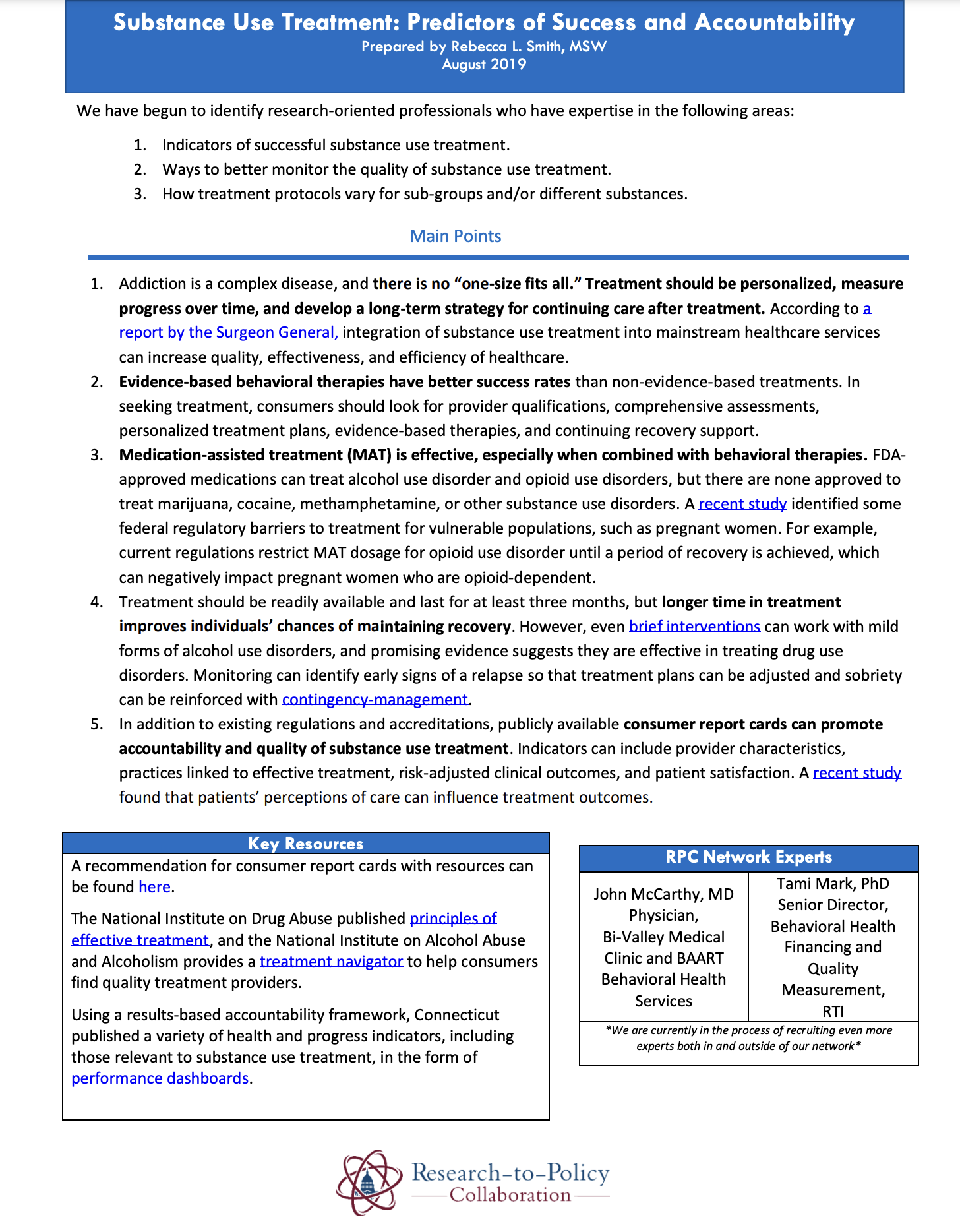
We have begun to identify research-oriented professionals who have expertise in the following areas:
- Indicators of successful substance use treatment.
- Ways to better monitor the quality of substance use treatment.
- How treatment protocols vary for sub-groups and/or different substances.
Main Points
- Addiction is a complex disease, and there is no “one-size fits all.” Treatment should be personalized, measure progress over time, and develop a long-term strategy for continuing care after treatment. According to a report by the Surgeon General, integration of substance use treatment into mainstream healthcare services can increase quality, effectiveness, and efficiency of healthcare.
- Evidence-based behavioral therapies have better success rates than non-evidence-based treatments. In seeking treatment, consumers should look for provider qualifications, comprehensive assessments, personalized treatment plans, evidence-based therapies, and continuing recovery support.
- Medication-assisted treatment (MAT) is effective, especially when combined with behavioral therapies. FDA-approved medications can treat alcohol use disorder and opioid use disorders, but there are none approved to treat marijuana, cocaine, methanphetamine, or other substance use disorders. A recent study identified some federal regulatory barriers to treatment for vulnerable populations, such as pregnant women. For example, current regulations restrict MAT dosage for opioid use disorder until a period of recovery is achieved, which can negatively impact pregnant women who are opioid-dependent.
- Treatment should be readily available and last for at least three months, but longer time in treatment improves individuals’ chances of maintaining recovery. However, even a brief interventions can work with mild forms of alcohol use disorders, and promising evidence suggests they are effective in treating drug use disorders. Monitoring can identify early signs of a relapse so that treatment plans can be adjusted and sobriety can be reinforced with contingency management.
- In addition to existing regulations and accreditations, publicly available consumer report cards can promote accountability and quality of substance use treatment. Indicators can include provider characteristics, practices linked to effective treatment, risk-adjusted clinical outcomes, and patient satisfaction. A recent study found that patients’ perceptions of care can influence treatment outcomes
Key Resources
- A recommendation for consumer report cards with resources can be found here.
- The National Institute on Drug Abuse published principles of effective treatment, and the National Institute on Alcohol Abuse and Alcoholism provides a treatment navigator to help consumers find quality treatment providers.
- Using a results-based accountability framework, Connecticut published a variety of health progress indicators, including those relevant to substance use treatment, in the form of performance dashboard.
The Research-to-Policy Collaboration (RPC) works to bring together research professionals and public officials to support evidence-based policy. Please visit their website to learn more.
Key Information
RPC Website
Research-to-Policy Collaboration
More RPC Resources
RPC Resources
Publication DateAugust 1, 2019
Topic Area(s)Health, Substance Use and Misuse
Resource TypeWritten Briefs
Share This Page
We have begun to identify research-oriented professionals who have expertise in the following areas:
- Indicators of successful substance use treatment.
- Ways to better monitor the quality of substance use treatment.
- How treatment protocols vary for sub-groups and/or different substances.
Main Points
- Addiction is a complex disease, and there is no “one-size fits all.” Treatment should be personalized, measure progress over time, and develop a long-term strategy for continuing care after treatment. According to a report by the Surgeon General, integration of substance use treatment into mainstream healthcare services can increase quality, effectiveness, and efficiency of healthcare.
- Evidence-based behavioral therapies have better success rates than non-evidence-based treatments. In seeking treatment, consumers should look for provider qualifications, comprehensive assessments, personalized treatment plans, evidence-based therapies, and continuing recovery support.
- Medication-assisted treatment (MAT) is effective, especially when combined with behavioral therapies. FDA-approved medications can treat alcohol use disorder and opioid use disorders, but there are none approved to treat marijuana, cocaine, methanphetamine, or other substance use disorders. A recent study identified some federal regulatory barriers to treatment for vulnerable populations, such as pregnant women. For example, current regulations restrict MAT dosage for opioid use disorder until a period of recovery is achieved, which can negatively impact pregnant women who are opioid-dependent.
- Treatment should be readily available and last for at least three months, but longer time in treatment improves individuals’ chances of maintaining recovery. However, even a brief interventions can work with mild forms of alcohol use disorders, and promising evidence suggests they are effective in treating drug use disorders. Monitoring can identify early signs of a relapse so that treatment plans can be adjusted and sobriety can be reinforced with contingency management.
- In addition to existing regulations and accreditations, publicly available consumer report cards can promote accountability and quality of substance use treatment. Indicators can include provider characteristics, practices linked to effective treatment, risk-adjusted clinical outcomes, and patient satisfaction. A recent study found that patients’ perceptions of care can influence treatment outcomes
Key Resources
- A recommendation for consumer report cards with resources can be found here.
- The National Institute on Drug Abuse published principles of effective treatment, and the National Institute on Alcohol Abuse and Alcoholism provides a treatment navigator to help consumers find quality treatment providers.
- Using a results-based accountability framework, Connecticut published a variety of health progress indicators, including those relevant to substance use treatment, in the form of performance dashboard.
The Research-to-Policy Collaboration (RPC) works to bring together research professionals and public officials to support evidence-based policy. Please visit their website to learn more.

Key Information
RPC Website
Research-to-Policy Collaboration
More RPC Resources
RPC Resources
Publication DateAugust 1, 2019
Topic Area(s)Health, Substance Use and Misuse
Resource TypeWritten Briefs
Share This Page
LET’S STAY IN TOUCH
Join the Evidence-to-Impact Mailing List
Keep up to date with the latest resources, events, and news from the EIC.




